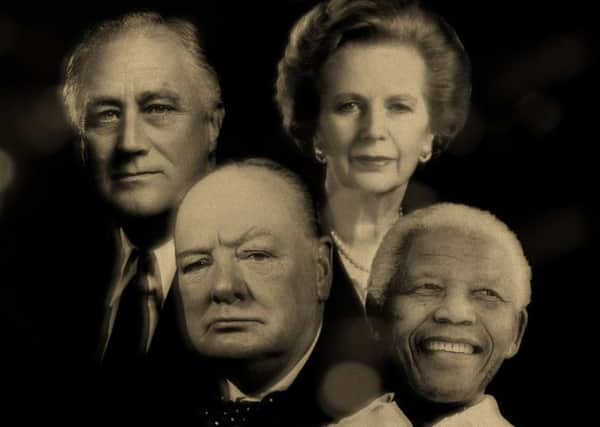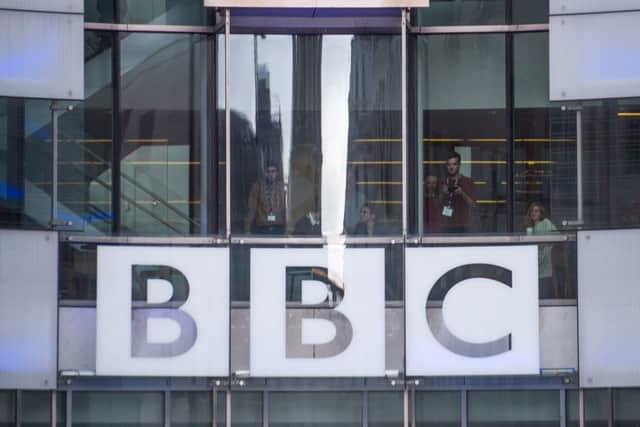David Behrens: The BBC – A landmark of dumbing-down amid twilight of the licence fee for over-75s


The result, I fancy, would have been roughly the same as this week’s imbecilic public vote which saw the wartime codebreaker and computer pioneer Alan Turing named the greatest “icon” of the 20th century.
Advertisement
Hide AdAdvertisement
Hide AdHe was thus judged to be more influential than six other finalists, selected apparently at random by the same method used to pick the lottery numbers. Nelson Mandela, Ernest Shackleton, David Bowie and Muhammad Ali – but not Winston Churchill – were among the others.


All are male, you will notice.
When I first heard that this was to be a BBC programme, I assumed it would manifest itself as an episode of the sitcom W1A, in which the corporation sends up its own obsession with committees and management culture. But not even a group of first-year media students could have come up with a concept as ill-conceived as this.
Apart from anything else, what was the point? All of the above-mentioned people are eminent in their field; what is to be gained by attempting to communicate to a young and impressionable audience that one is better than the others?
Are we now to lower our opinion of Nelson Mandela because he never had a number one single, or led an expedition to the Antarctic? Art, philosophy and science, as Lord Clark understood, are the crucibles of culture – they shouldn’t be reduced to the level of It’s a Knockout on Scarborough beach.
Advertisement
Hide AdAdvertisement
Hide AdTV, of course, is littered with “list” programmes, especially where popular culture is concerned. But most of them are designed as entertaining diversions on Channels Four and Five. They don’t masquerade as education, they are not portentous and they don’t come out of the licence fee.
Icons, on the other hand, was an insidious dumbing-down of history, and one the BBC should never have countenanced. Unlike Civilisation, it is a series that will not live on in repeats – though it may come back to haunt it.
Its screening came amid the debate on whether the licence fee should continue to be waived for viewers over 75. The Government subsidy which allows this runs out next year, and it is being left to the BBC to decide whether it should continue, and if so, how.
This doesn’t augur well, does it? On the Corporation’s current form, it will probably turn that into a game show, too. Let’s see if dad can figure out how to use the red button on the remote control. He can? No free licence for him, then.
Advertisement
Hide AdAdvertisement
Hide AdIt’s becoming inevitable that the system, free or otherwise, is nearing the end of its useful life. This week saw the revelation that some 860,000 of us cancelled our licences last year – eight per cent more than in 2017.
For them, the equation will not have been whether to watch TV but which TV to watch. From this spring, the licence fee will be £154.50 a year, which works out at just under £13 a month. A subscription to Netflix can be had for less than half that, and can be suspended when you go on holiday. It’s a model that makes the pre-war notion of a tax on receiving equipment as archaic as an air-raid shelter.
Nor do you need a licence just for the privilege of owning a TV set. The fee doesn’t apply if you don’t watch or record live TV or use the BBC iPlayer.
Armed with that get-out, and the increased choice of viewing now available – not to mention the insult to their intelligence from programmes such as Icons – many families on both sides of the age divide will reluctantly conclude that the BBC is no longer for them. And when they do, no politician will expect the viewers who are left to fund the national broadcaster by themselves – especially when it is riven with gender inequality and reprehensible employment practices.
Advertisement
Hide AdAdvertisement
Hide AdI spent some time scanning the BBC’s Spring schedules in the hope that the picture will improve. So far as I can see, the highlight so far is a documentary about the Bauhaus art movement, which will be presented by the comedian Vic Reeves.
He is no Kenneth Clark, but let’s not pre-judge. Eight decades from now, our grandchildren will probably be asked to vote him an icon of the 21st century.